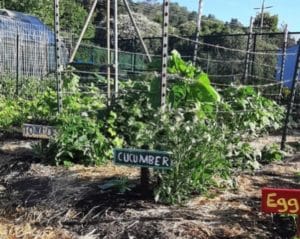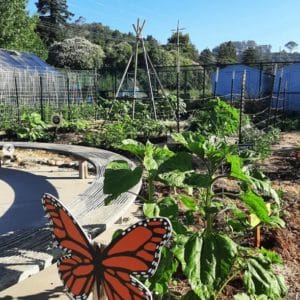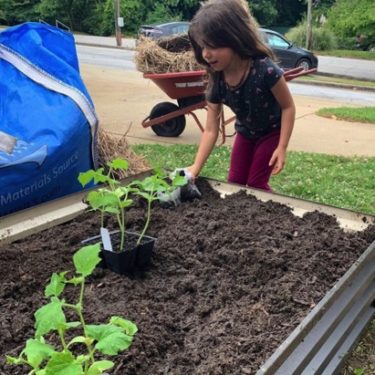Gardens are beautiful in every sense of the word. A home for flora and fauna, birds, insects and animals. A natural respite to ground yourself. An area for hands-on exploration. A slice of earth to support healthy soils and ecosystem cycles. A living learning space to experiment. A place to plant, grow and harvest anything, including food to nourish the community. Since we launched Conscious Kitchen in Marin City in 2013, the CK Garden has been the site for hands-on lessons, work days, and harvests packed to send home with students.
During the spring of 2020, as people were forced to stay home during the pandemic, many school and community gardens were left untended, while lines and lists for food relief programs grew enormously.
In Atlanta, over 300 schools are home to Project Learning Garden, outdoor learning spaces for students to engage in cross-discipline, project-based learning. Run by Captain Planet Foundation, the organization recognized both need and opportunity, which took shape in the form of Project Giving Gardens to distribute fresh food from gardens to students and families negatively affected by Covid-19. In partnership with Food Well Alliance and the Atlanta Community Food Bank, the program has planted, cultivated, and distributed over 100,000 pounds of fresh food and over 400,000 servings from 100+ school gardens and 20+ community gardens.
Ashley Rouse, the Director of Project Learning Garden and Project Giving Gardens, recognized the impact that schools participating in Project Learning Garden could make by both teaching students about gardens and creating the ability to feed others. “Students can be at summer school and prioritize this type of program,” she shared her excitement about what gardens and families can do together in a recent interview.

Project Giving Gardens is creatively and positively changing the system of food distribution and addressing various barriers families encounter, societal challenges only exacerbated by the pandemic. In Atlanta, one of PGG’s partners, Food Connect, contacts growers, picks up the food, tracks which pantry or recipient it goes to, and eases barriers of transportation for food pick-up. By quantifying data of this program, such as carbon sequestration, total land used for growing, and costs of planting from seed, PGG can better understand impact, improve efficiency, scale the program, and share the story.
Project Giving Gardens sought to expand the program in 2021 first into the Bay Area and then other regions. Our Conscious Kitchen team offered new connections and networks of helpers who put their hearts into the program and helped connect dots to schools, community gardens and organizations, especially in Marin and the East Bay where we run on-the-ground programs. Currently, 28 schools are PGG sites in Oakland, numbers that could increase drastically across the nation through future partnerships with organizations like Food Corp, supporting Ashley’s expansion goals.
Vanessa Lyons, the Garden Coordinator for Conscious Kitchen, is thrilled that Project Giving Gardens ties hand-and-hand into the existing gardens and can transform them into donation bases to highlight the great work done by growers.
She firmly believes gardens can positively educate future generations. One of the most rewarding parts of students caring for and learning from a garden is “their connection to the food and knowing they grew it from seed to finish. They can be curious about the food and how it relates to their bodies,” she shared. Gardens are a creative way for students to apply what they learn in the classroom to the natural world and give back to the Earth and to families who receive the food.
Vanessa’s top three tips for creating or maintaining a garden of your own include: irrigation and a consistent water supply, a protected greenhouse for starts, and ensuring plants receive care from the growers. Flowers are also an important part of any garden because of their role in pollination and food production, a message Vanessa left us with. “Don’t forget the flowers.”

Project Giving Gardens can not only benefit from school or community gardens, but also from backyard gardens, which are dear to the Founder and Executive Director of Conscious Kitchen, Judi Shils. With the help of 20 volunteers, Judi transformed her backyard into a giving garden and has already harvested produce, such as lettuce and kale, to donate to the nearby Marin City community where the first Conscious Kitchen is located. The gift of giving is “a language that we all share,” she reminded us. When we effect change, we open up the possibilities of “teaching, friendship, and leading healthy lives.” These are invaluable lessons that will continue to thrive with the budding Project Giving Gardens in the Bay Area and across the country.
To read more about Project Learning Garden and Project Giving Gardens or to get involved locally, in Atlanta, the Bay Area or elsewhere, click here.
